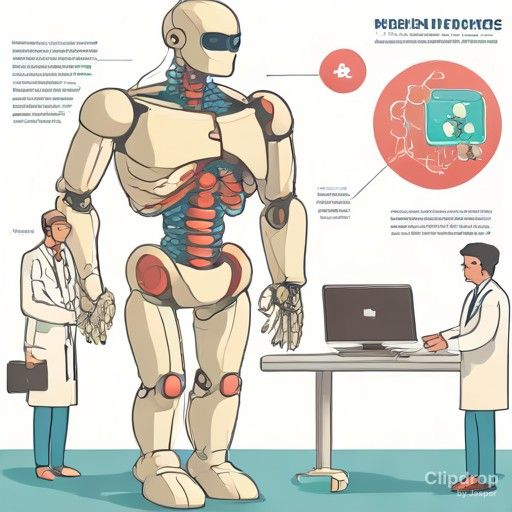Made with 💖 by Ankit Kaushik


Artificial intelligence has the potential to greatly enhance the process of diagnosis and treatment planning in healthcare. With advanced algorithms and machine learning capabilities, AI can analyze vast amounts of patient data and identify patterns and correlations that may not be easily detectable by human physicians. This can lead to more accurate and timely diagnoses, as well as more effective treatment plans tailored to each individual patient's needs.
Additionally, AI can assist healthcare professionals in identifying the most appropriate treatment options based on a patient's specific condition and medical history. By taking into account factors such as genetic information, previous treatment outcomes, and ongoing research, AI can provide valuable insights and recommendations to support decision-making in the healthcare field.
In addition to improving patient care, artificial intelligence can also streamline administrative processes in healthcare settings. AI-powered systems can automate tasks such as appointment scheduling, medical record management, and billing, reducing the burden on administrative staff and freeing up their time to focus on more complex tasks.
Furthermore, AI can help optimize resource allocation and workflow management within healthcare facilities. By analyzing data on patient flow, staff schedules, and equipment utilization, AI algorithms can identify bottlenecks and inefficiencies, enabling healthcare organizations to make informed decisions and allocate resources more effectively.
One of the major advantages of artificial intelligence in healthcare is its ability to provide personalized patient care. AI algorithms can analyze individual patient data, including medical records, genetic information, and lifestyle factors, to generate personalized treatment plans and recommendations.
By taking into account a patient's unique characteristics and circumstances, AI can help healthcare professionals deliver more tailored and precise care. This can lead to better treatment outcomes, improved patient satisfaction, and ultimately, a higher quality of care for all individuals.
Artificial intelligence is revolutionizing the process of drug discovery and development. With its ability to analyze large datasets and identify patterns, AI can accelerate the identification of potential drug targets and predict the efficacy and safety of new compounds.
By leveraging machine learning algorithms, researchers can explore vast chemical and biological spaces, leading to the discovery of novel drug candidates that may have been overlooked using traditional methods. This can significantly reduce the time and cost associated with bringing new drugs to market, ultimately benefiting patients by providing them with faster access to innovative treatments.
Telemedicine, or the provision of healthcare services remotely through technology, has become increasingly important in recent years, and artificial intelligence is playing a significant role in its enhancement. AI-powered systems can assist in remote diagnosis, monitoring, and treatment, enabling healthcare professionals to provide high-quality care to patients who may be located in remote or underserved areas.
Additionally, AI can support the interpretation of medical images and facilitate remote consultations between healthcare providers, improving collaboration and access to specialized expertise. This can help overcome geographical barriers and ensure that patients receive timely and appropriate care, regardless of their location.